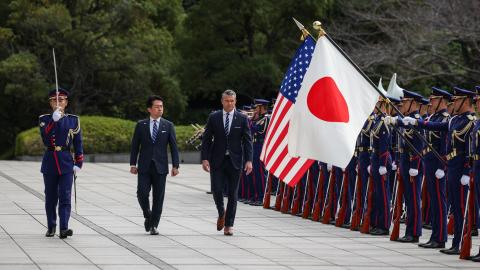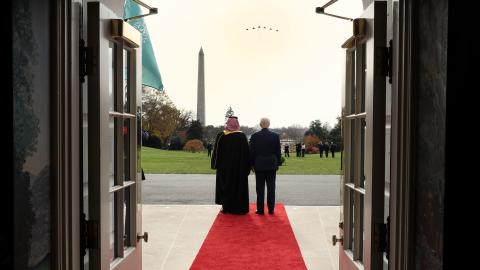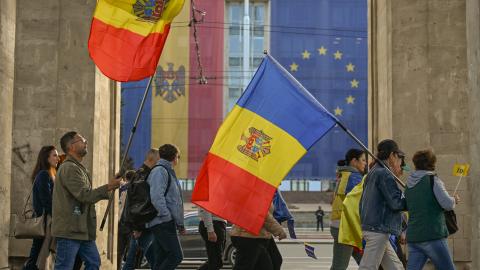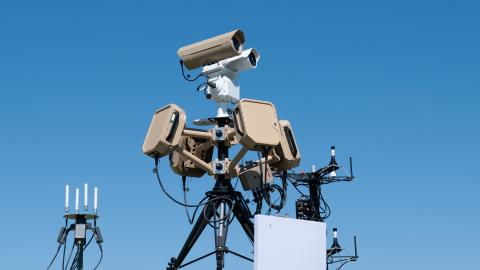This past Sunday night, the Egyptian revolution that toppled Hosni Mubarak took another wrong turn when the same army once believed to be "hand in hand" with the people killed 27 Coptic Christians in Cairo and wounded hundreds of others. The Copts were marching toward Egyptian state television in the Maspero area to demand that the ruling authorities fulfill their obligations to the Christian minority. After the marchers were stoned by Muslim bystanders during their march, state security and the military attempted to put down the demonstration. When the authorities started to beat the protesters, the Copts fought back. The police opened fire, killing several Copts as others were crushed when soldiers turned their military vehicles into the crowds, leaving a trail of unspeakable gore in their wake.
This most recent expression of violence against the Copts will resonate for some time to comenot least because it appears that some local Muslim bystanders cheered on the army while others took an active role in the violence. (Here's a video of a soldier who boasts of having shot a Copt in the chest and is cheered on by a crowd.) Egyptian state television called on "loyal Egyptians"i.e. Muslimsto come to the streets to protect the army from the Copts, which evidently did draw many, including Salafists, to the incident.
Sunday night's bloodshed is further evidence that, even if the army was the agent of violence, anti-Copt sentiment is widespread. The Sunday march was preceded by a smaller demonstration last week when Copts protested an attack on a church in Edfu, almost 500 miles south of the Egyptian capital, and demanded that the Muslim gangs responsible for the destruction of the church be brought to justice. The army and security forces beat Copt protesters when they marched last week, too, as this video shows. Perhaps what's most noteworthy in this clip is that after the first few blows the officer in charge, in a red beret, seems to be trying to stop his troops from striking further. At one point the officer even hits one of the soldiers. This suggests that while Egypt's ruling body, the Supreme Council of the Armed Forces, is intent on keeping the streets quiet and free of Copt activists, it is unlikely they ordered the army to kill civilians. Rather, it seems that individual soldiers acted on their own.
"There's this idea that Egypt's army is a professional force," says Samuel Tadros, a research fellow at Hudson Institute's Center for Religious Freedom, and a senior partner at the Cairo-based Egyptian Union of Liberal Youth. "This is a mistake."
We're sitting in a café in Georgetown along with a colleague of his from EULY, Mina Rezkalla, visiting from Cairo whose family lives in the Shubra district where Sunday's march originated. Two of Rezkalla's friends were killed, including a young man recently engaged to be married. He shows me the engagement photo of his friend and his fiancée, and then another of the same woman sobbing over her fiancé's mutilated corpse.
"The officers are professional," says Tadros, "and there are professional units, like Special Forces, but these people were regular conscripts." Every Egyptian male, unless he is the family's only son, is required to serve in the military, which means that the army draws from a 90 percent Muslim majority across the general population that is typically hostile to Copts. "The soldiers are acting just like they would back in their village if they got into a fight with Copts," says Tadros. "These officers have lost control of their soldiers."
In the aftermath of Sunday's bloodbath, the White House issued a statement from President Obama urging "restraint on all sides" and lamenting the "tragic loss of life among demonstrators and security forces." It seems the president was basing his erroneous assumption on early charges made by the Egyptian media that security and military personnel had been killed as well as Copt civilians, claims Egyptian officials retracted Monday. Only Copts were killed.
And yet despite their losses, it is difficult to imagine that Egypt's ancient Christian community is about to recede into the shadows. Sunday's events are proof not only of the army's brutality and much of the majority Muslim community's hatred of their non-Muslim neighbors, but also of a now-mobilized minority's courage and pride. This Coptic awakening has been several decades in the making.
"If the Kurds are the Middle East's most neglected minority," says Tadros, "the Copts are the loneliest." The Copts are proud of the fact that in spite of the Arab conquests and other violent encroachments on their community they did not fall like other long-forgotten and long-gone regional minorities. And in contrast to other surviving minority groups, like Lebanon's Maronite and Druze sects, the Copts lacked influence abroad, which is to say they have been relatively separated from Western Christendom. They received little help, or even friendship, from London during Britain's 72-year-long occupation of Egypt, and have been able to count on little support from Washington over the years, despite a substantial number of Coptic immigrants scattered throughout the United States.
Still, the international community's indifference hardly spares Copts the contempt and suspicion of many of their Muslim compatriots, while the country's elite ignores Muslims' open hatred of Christians and insteadblames Israel for Egypt's sectarian strife. (Here, the "moderate" Islamist candidate for president Abdel Moneim al-Fotouh says Zionists were behind Sunday's events.) One popular iteration of this conspiracy theory holds that former head of Israeli military intelligence Amos Yadlin openly bragged about Israel's success in "promoting sectarian tension" in Egypt. It seems this bogus narrative first appeared on an Arab Israeli website, where Hezbollah picked it up before it hit the mainstream of Egypt's Muslim community. Of course, Yadlin never said anything of the sort. "It's total nonsense," he told me in Washington, where he is a visiting fellow at the Washington Institute for Near East Policy. "What Israel wants, and what I want, is a stable and democratic Egypt that will contribute to the peace and betterment of the greater Middle East."
The fate of the Arab Spring shows just how difficult this is going to be. What we've seen revealed over the last eight months are the numerous sectarian tensions that are usually obscured by the world's focus on the Arab-Israeli conflict. But now the banner of Arab resistance under which for instance all Syrians once rallied is no longer relevant in a state where the ruling Alawite minority slaughters the majority Sunni oppositionwith the support of Syrian minorities, including the Christians. In Bahrain, the Sunni government targets its Shia population, and in Lebanon and Iraq, the Shiites and the Sunnis are only for the time being deterred from going at each other's throats, again. The Arabs may have no peace with Israel; but neither do the various sects and ethnicities (Sunnis, Shia, Kurds, etc.) commonly rolled into one and described by the blanket term "Arab" have peace with each other.
Tadros argues that even as Copts served in Egypt's wars against the Jewish state, the community never had an issue with Israel. "Arab nationalism was an ideology that many Orthodox Christians from Syria and Lebanon pushed," he says, "but not the Copts."
For most of the last century, the community was politically quiescent, at least until 1977 when the Coptic Pope, Shenouda, opposed President Anwar Sadat's plan to incorporate more aspects of sharia into the Egyptian constitution in order to placate his growing Islamist problem. Shortly before Sadat's first trip to meet the recently elected Ronald Reagan, scores of Copts were massacred in Cairo in June 1981 by Islamists as well as local residents while the police did little to stop the slaughter (Copts claim 181 were killed while Egyptian authorities say the casualty figures are much lower). For the Egyptian leader, his visit to Washington was overshadowed by the large numbers of Copts demanding justice for their slain relatives. Fearing that Shenouda was getting too powerful, and accusing him of attempting to create an independent Christian state in Egypt, Sadat had him put under house arrest, and announced that the state no longer recognized Shenouda as pope. Even as most of Sadat's other political adversaries were forgiven by the new Egyptian president Hosni Mubarak in the wake of Sadat's murder at the hands of Islamists, Shenouda was held in a monastery until January 1985.
For more than 15 years, Tadros explains, "the pope was quiet and there were no clashes with the government, even as there were several massacres of Copts that the Mubarak regime did little to prevent. But from the Copts' perspective, it was wise to side with a government that was taking on the likes of Ayman al-Zawahiri." Even worse was Omar Abd el-Rahmanthe so-called "Blind Sheikh" now being held in an American prison for his role in the 1993 World Trade Center attackwho published a fatwa declaring that it was licit to rob and kill Copts. The 1997 massacre at Luxor, where Islamists killed 62 people, 58 of them foreign tourists, effectively brought an end to the jihadist insurgency as the Mubarak regime showed the militants no mercy in the aftermath of an attack that brought the Egyptian economy to a standstill.
Tadros and Rezkalla explain that the Coptic community saw the post-insurgency period as an opportunity to promote their community's interests. The years 2001-2010 were crucial in forging a new identity among the Copts. Aside from a demonstration in front of the headquarters of a tabloid that had published scurrilous rumors about the clergy, there were few public protests. But there was plenty of political action on church grounds and within the churches themselves, led by several young priests. They published a magazine distributed in churches, The Theban Legion named after 6,000 Coptic legionnaires of the Roman army stationed in Thebes who were martyred in the third century for refusing to offer the emperor a sacrifice. The clergy also started a group for young activists called "Kimi." Rezkalla writes the word out for me in the Coptic alphabet and says that it refers to the fertile mud brought forth by the Nile. "It's how the pharaohs used to refer to Egypt," says Tadros"Kimi."
In November 2010 the Copts first came into open conflict with the security forces when they protested against the local government in Giza for suspending building of a new church. "It was also the first time the Copts refused a direct order coming from the pope," says Rezkalla. However, Tadros allows it might have been a clever political move on Shenouda's part in order to increase his own leverage with the Mubarak regime. "He might have been saying, 'you see how they ignore me, so you have to give me some concessions I can show them.'" These were not the fatalistic Copts of old. Instead, they carried crosses and shouted slogans"Raise your head up high, you are a Copt."
About the January 25 uprising that eventually toppled Mubarak, the Coptic community was wary, understanding that for all Mubarak's faults he had put down an Islamist insurgency in the '80s and '90s that specifically targeted Copts. Nonetheless, explains Tadros, many of the younger Copts were hopeful after Mubarak stepped down, at least until they realized that everyone's demands were being metespecially those of the Islamists, and the revolutionariesexcept the Copts. Indeed, no one was even held responsible for vicious attacks on the community, like the 2011 New Year's Eve burning of a church in Alexandria.
So where do the Copts go from here? Their status and that of other regional Christian communities suggests that the Muslim fundamentalists had it rightfirst the Saturday people will go and then the Sunday people. The difference is that the Jews have their own statealong with an army, a nuclear weapon and a thriving economy based on the IT sector. There is no Christian refuge in the Middle East, not even Lebanon where the Maronites have seen their power evaporate so quickly that the part of the community which follows Michel Aoun seems not understand that his alliance with Hezbollah is in reality a suicide pact.
That recognition, among other reasons, is why the Copts will never come to a similar accommodation with Egypt's Islamist groups. Nor on the other hand can they expect much success in their continued efforts to defend themselves. They have neither the numbers to protect themselves against the 90 percent Muslim majority, nor the geography. There are no mountains for the Copts to hide among, like the Kurds, Druze, Maronites, and Alawites, nor are there sufficiently large enough concentrations of Copts to make the sort of lasting self-defense that might turn into self-determination plausible. To be sure, as we saw on Sunday, the Copts will fight, but as we also witnessed, they won't win.
















